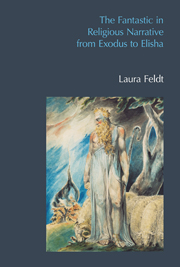Book contents
- Frontmatter
- Contents
- Acknowledgements
- Introduction: More Things—Marvels, Monsters, Miracles
- 1 Fields of Fantasy
- 2 Fantasy and Religious Narrative: Theory and Strategy
- 3 Marvels, Magic and Mystery: Reading the Fantastic in the Exodus Narrative
- 4 Between Wonder and Doubt: Fantastic Strategies, Their Effects and Status in the Exodus Narrative
- 5 Exodus as Mnemo-Fantasy: The Functions of the Fantastic in the Exodus Narrative
- 6 From Ethnogenesis to Everyday Life: Contextualizing the Fantastic in Hebrew Bible Narrative
- 7 Es spukt…—The Fantastic in Religious Narrative
- Bibliography
- Index of Biblical References
- Index of Authors
Introduction: More Things—Marvels, Monsters, Miracles
- Frontmatter
- Contents
- Acknowledgements
- Introduction: More Things—Marvels, Monsters, Miracles
- 1 Fields of Fantasy
- 2 Fantasy and Religious Narrative: Theory and Strategy
- 3 Marvels, Magic and Mystery: Reading the Fantastic in the Exodus Narrative
- 4 Between Wonder and Doubt: Fantastic Strategies, Their Effects and Status in the Exodus Narrative
- 5 Exodus as Mnemo-Fantasy: The Functions of the Fantastic in the Exodus Narrative
- 6 From Ethnogenesis to Everyday Life: Contextualizing the Fantastic in Hebrew Bible Narrative
- 7 Es spukt…—The Fantastic in Religious Narrative
- Bibliography
- Index of Biblical References
- Index of Authors
Summary
Narratives about fantastic events, magical acts and monstrous beings are as common today as they are in ancient literature, and biblical literature is no exception. Eliciting both wonder and doubt, such stories often speak of what we can—and cannot—do with words. They tell of unexpected, boundary-transgressive and inexplicable things, of alternative worlds, supernatural personae, and incredible events, of monsters, magic, miracles, marvels—the ‘more things’ in heaven and on earth of Shakespeare and Borges that the header above evokes. In literary criticism, theories of the fantastic and fantasy abound, but they are rarely applied to religious narrative. This book does exactly that. My theses are that fantasy theory may contribute fruitfully to the study of religious narrative, and that the fantastic elements of the religious narratives that I treat are sites of ambiguity, uncertainty and mutability.
In this study, I apply fantasy theory to the Exodus narrative (Exod. 1–18) and to a selection of additional Hebrew Bible narratives, and I discuss the functions of the fantastic in Hebrew Bible religious narrative and the possible contribution of literary fantasy theory to the broader study of religious narrative. The academic study of religion has not previously paid much attention to fantasy theory as an approach to religious narrative. I hope to show the fruitfulness for the study of religious narrative and for the study of Hebrew Bible religion of tilling this particular ground.
- Type
- Chapter
- Information
- Publisher: Acumen PublishingPrint publication year: 2012



